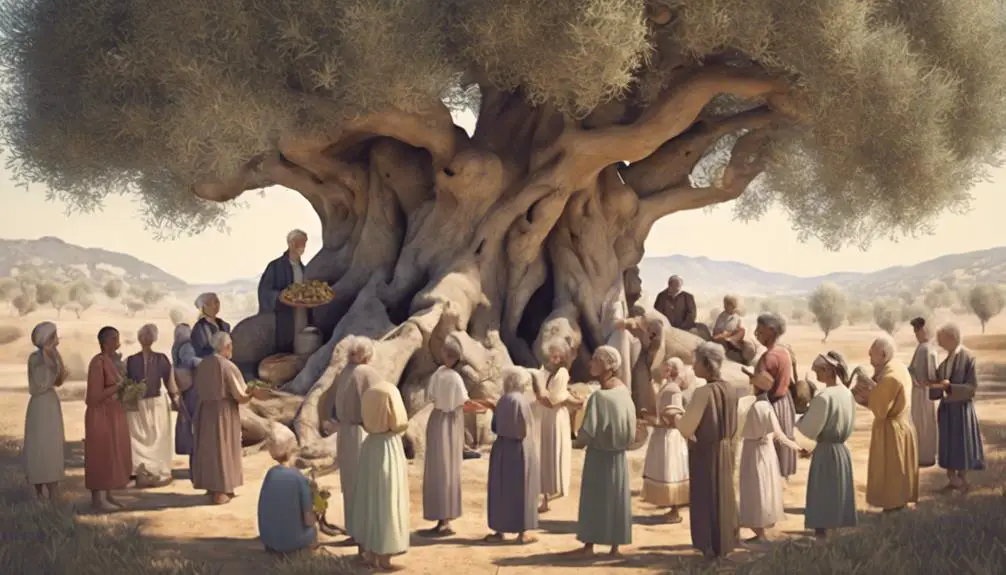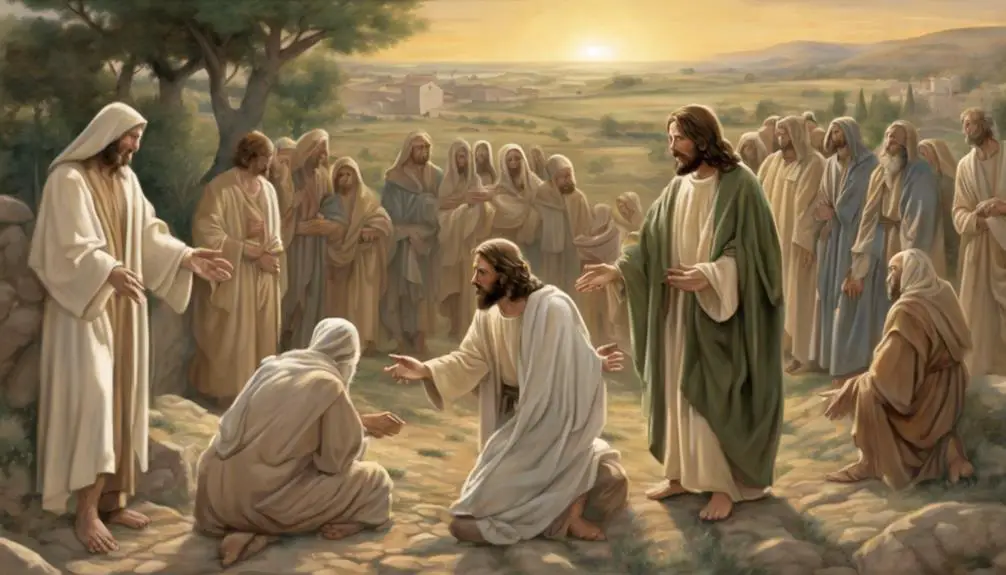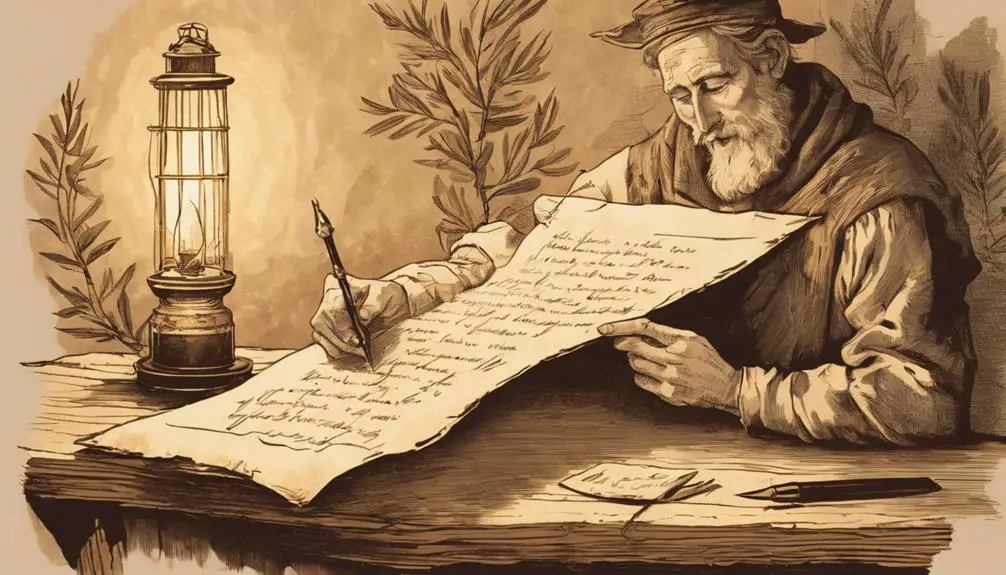From Job's resilience to the grateful leper, explore how Biblical stories of thankfulness can transform your perspective on gratitude today.

Stories About Thankfulness in the Bible
In an era where gratitude often gets lost in the shuffle of email notifications and social media updates, stories of thankfulness from the Bible offer you a refreshing perspective. You'll find yourself intrigued by tales like Job's unwavering gratitude amidst suffering, David's poetic thanksgivings, and the singular leper who returned to thank Jesus.
Each narrative, from Paul's heartfelt letters to Mary's jubilant Magnificat, invites you into a deeper appreciation of gratitude's power. As you explore these stories, you'll uncover timeless lessons that resonate with your life today, leaving you curious about the transformative effect gratitude can have.
Key Takeaways
- Biblical figures like Job, David, and Mary exemplify gratitude towards God, even in adversity.
- Thankfulness fosters community, as seen in Paul's letters and David's psalms, uniting people through shared acknowledgment of divine provision.
- Stories of healing, like the cleansed leper, highlight gratitude's role in faith and the transformative power of divine intervention.
- The Bible links gratitude with God's promises, illustrating how a thankful heart anticipates and celebrates fulfillment and divine faithfulness.
The Gratitude of Job

Despite enduring unimaginable suffering, Job's enduring gratitude towards God exemplifies a profound lesson in unwavering faith and thankfulness under dire circumstances. This narrative, deeply embedded within the tapestry of biblical literature, offers a rich context for exploring the multifaceted relationship between human suffering and divine providence. Job's patience, as he navigates through his trials, isn't merely a testament to his character but a pivotal theological construct that challenges and expands our understanding of gratitude.
The story of Job isn't a superficial account of adversity but a complex exploration of suffering's lessons on the human spirit. Job's resilience, in the face of relentless calamity, is underpinned by his steadfast belief in God's inherent goodness and justice. This unwavering faith, despite the absence of immediate relief or explanations, underlines a profound narrative of hope and thankfulness that transcends his temporary afflictions.
Analyzing Job's ordeal, you're invited to reflect on the essence of gratitude—not as a reactionary emotion to positive outcomes but as an inherent recognition of life's broader meaning and purpose, even amidst profound suffering. Job's narrative encourages a reevaluation of thankfulness, suggesting it be rooted in faith and understanding rather than contingent upon the fluctuating circumstances of our lives.
David's Songs of Thanks

Turning our attention to David's Songs of Thanks, we encounter another profound expression of gratitude that transcends mere circumstance, offering insight into the enduring nature of thankfulness when grounded in a deep faith and understanding of divine will. David's psalms reveal a multifaceted approach to thanksgiving, intricately woven with the threads of heartfelt worship and an acknowledgment of God's sovereignty. His songs aren't just personal expressions of gratitude but serve as communal hymns during harvest celebrations, uniting people in a shared acknowledgment of divine provision and care.
In analyzing these songs, it's clear that David's thankfulness isn't superficial or fleeting. Instead, it's deeply rooted in his life's experiences, reflecting an ongoing dialogue with God through both trials and triumphs. His ability to maintain a posture of gratitude, even in adversity, underscores the transformative power of a thankful heart. This heart of gratitude doesn't merely celebrate the abundance of harvest but recognizes God's hand in every aspect of life.
David's example teaches us that heartfelt worship and thanksgiving aren't confined to moments of abundance. Rather, they're a continuous acknowledgment of God's presence and providence, fostering a spirit of thankfulness that permeates every season of our lives.
Jesus Heals the Thankful Leper

In the narrative of Jesus healing the thankful leper, we observe a poignant instance of gratitude transforming an individual's life, both spiritually and physically. This story, deeply embedded within the biblical text, offers a profound examination of leprosy stigma and the power of healing faith. Through this lens, let's delve into the layers of meaning:
- Leprosy as a Metaphor for Sin: Historically, leprosy wasn't just a physical ailment but a symbol of impurity. The leper's healing signifies not only physical restoration but also spiritual redemption.
- Isolation to Inclusion: Leprosy caused individuals to be ostracized from their communities. Jesus' act of healing bridges this gap, demonstrating a move from isolation to inclusion, emphasizing the societal reintegration of marginalized individuals.
- Healing Faith: The leper's faith in Jesus' power to heal him is central. This underscores the belief that faith itself is a conduit for divine intervention and transformation.
- Gratitude as Transformation: The leper's return to express gratitude highlights the transformative power of thankfulness. It's not just the physical healing that's celebrated but the acknowledgment of a deeper, spiritual healing.
This narrative invites you to reflect on the profound implications of gratitude and faith, extending beyond the physical realm into the spiritual.
Paul's Letters of Appreciation

Paul's Letters of Appreciation, a cornerstone of the New Testament epistolary literature, reveal the apostle's profound gratitude for the faith and support of early Christian communities. These letters are not just personal communications; they're a blueprint for gratitude practices within the burgeoning Christian faith. Through his words, you delve into a world where community encouragement is paramount, and thankfulness is a spiritual discipline.
Paul's epistles serve as a testament to the power of gratitude in fostering community bonds. He often begins his letters with expressions of thanks, setting a tone of mutual respect and appreciation. This practice is not merely polite; it's a deliberate strategy to strengthen the ties within the Christian communities.
Letter |
Focus of Gratitude |
|---|---|
1 Thessalonians |
Their work of faith and labor of love |
Philippians |
Their partnership in the gospel |
Colossians |
Their faith in Christ Jesus |
Philemon |
The love and faith shared among believers |
These instances underscore the integral role of gratitude in Paul's ministry. By recognizing and voicing his appreciation, Paul not only uplifts the recipients but also models a behavior that encourages a culture of thankfulness—a key component in the resilience and growth of early Christian communities.
Mary's Magnificat

Mary's Magnificat, a profound expression of gratitude and humility, marks a pivotal moment in the biblical narrative, showcasing her deep spiritual insight and the transformative power of faith. Originating from her humble origins, Mary's song of praise encapsulates not only her personal journey but also signals the onset of a spiritual revolution. Through her words, you're invited to reflect on the deeper implications of her message:
- Recognition of God's Favor: Mary acknowledges her lowly state and the unmerited favor bestowed upon her, illustrating the divine preference for humility.
- God's Mighty Deeds: The song highlights God's power and mercy, extending from Mary to all who fear Him, bridging historical acts with present grace.
- Social Reversals: Mary's words anticipate the uplifting of the humble and the downtrodden, while the proud and powerful are scattered, signifying a radical shift in social order.
- Fulfillment of Promises: The Magnificat reaffirms God's faithfulness, connecting Mary's personal story to the broader narrative of Israel's hope and God's salvation plan.
In essence, Mary's Magnificat isn't just a personal testament but a beacon of hope, signaling a spiritual revolution where humility is exalted, and divine promises are fulfilled.
Frequently Asked Questions
How Can We Incorporate the Practice of Thankfulness From Biblical Stories Into Our Daily Lives, Especially in Modern Contexts?
To weave thankfulness into your daily life, consider adopting gratitude journaling. This practice invites you to reflect on daily blessings, mirroring biblical teachings on gratitude.
Additionally, thankfulness meditation can deepen your appreciation for life's gifts, fostering a mindful approach to gratitude. Both methods encourage a deliberate acknowledgment of life's positives, cultivating a habit of thankfulness that aligns with timeless principles, enriching your modern life with a sense of contentment and fulfillment.
Are There Any Psychological or Health Benefits Mentioned in the Bible Associated With Practicing Gratitude?
You're exploring if gratitude has psychological or health benefits noted in historical texts, yet the Bible doesn't explicitly link gratitude with health outcomes as modern research does.
However, gratitude research today shows significant positive impacts on mental and physical health, suggesting that the practice of thankfulness, even from ancient contexts, could enhance well-being.
This connection, while not directly mentioned in biblical narratives, aligns with contemporary findings on gratitude's role in improving life quality.
How Do Different Translations of the Bible Approach the Theme of Thankfulness, and Does the Interpretation Vary Significantly?
You're diving into how different Bible translations approach thankfulness, considering translation accuracy and cultural contexts. It's crucial because words can shift meaning across languages and eras.
Besides the Stories Mentioned, Are There Any Lesser-Known Biblical Characters or Narratives That Also Emphasize the Importance of Thankfulness?
Yes, beyond the well-known tales, you'll find Hezekiah's recovery and Naaman's cleansing as narratives underscoring thankfulness. Hezekiah's gratitude following his healing highlights a deep appreciation for life and divine intervention.
Similarly, Naaman's response to his miraculous cleansing from leprosy embodies a transformative gratitude toward God. These accounts, though less referenced, offer profound insights into the theme of thankfulness, illustrating its significance across various contexts.
How Have Historical Figures Within the Christian Tradition Interpreted and Practiced Thankfulness Based on Biblical Teachings?
You'll find that historical figures in the Christian tradition infused their lives with thanksgiving rituals and expressions of gratitude, deeply inspired by biblical teachings. They didn't just read about thankfulness; they lived it.
Conclusion
In analyzing these biblical narratives, it's clear that gratitude transcends mere acknowledgment; it's a profound expression of faith and trust. Job's resilience, David's poetic thanks, the healed leper's return, Paul's heartfelt letters, and Mary's magnificat all underscore a thematic tapestry where thankfulness is intricately linked with divine relationship and human humility.
This exploration reveals that, within the biblical context, gratitude isn't just an emotion but a foundational element of spiritual and communal identity.



Sign up